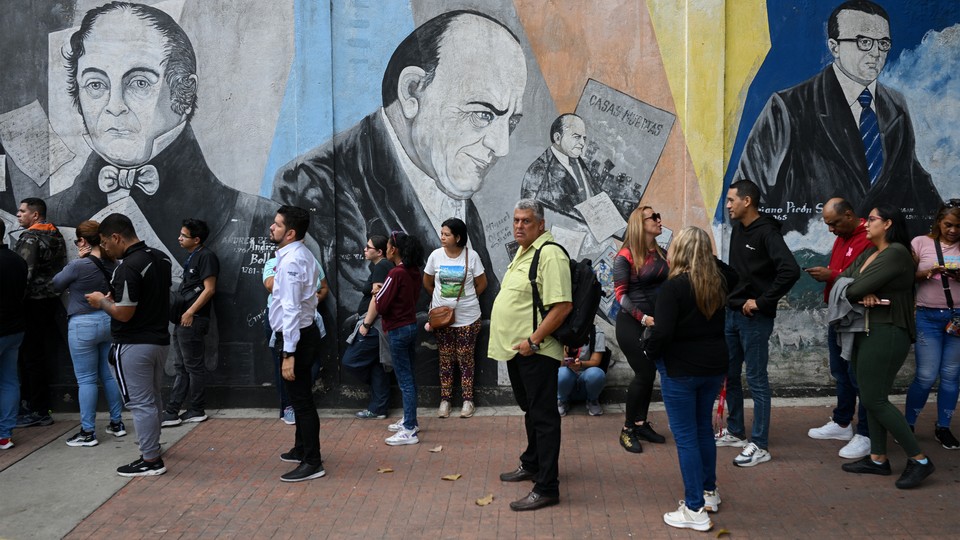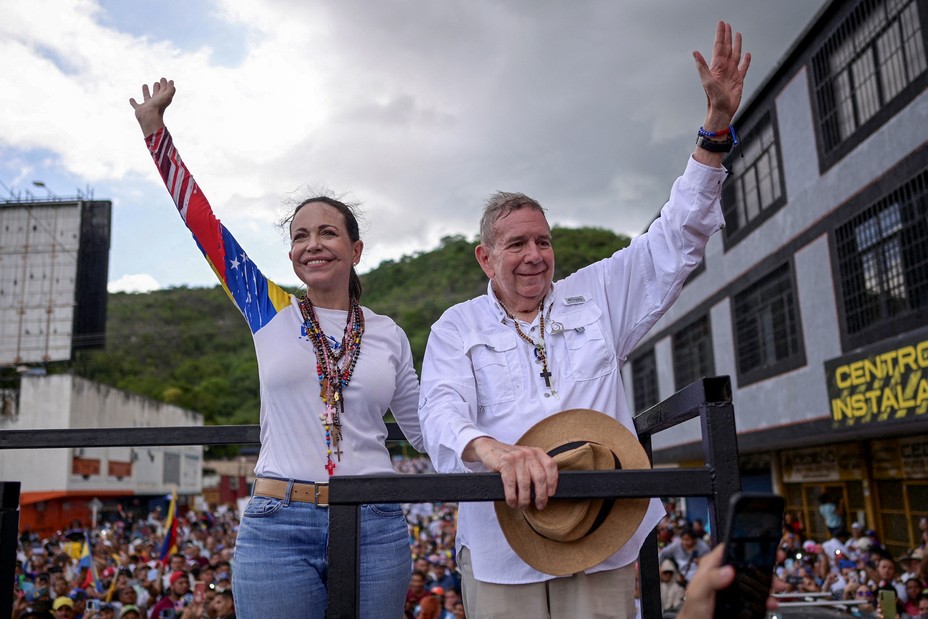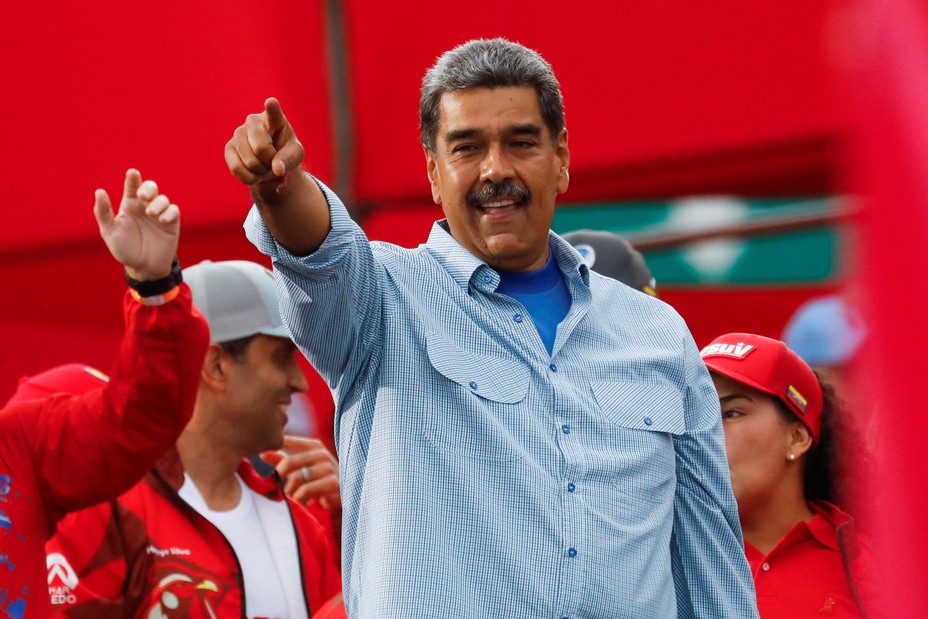The Venezuela That Defied Maduro
10 min read
On Sunday, an estimated two-thirds of Venezuelans, according to exit polls, voted for the opposition candidate—a brave, if fanciful, thing to do in a country ruled by a 25-year-old regime that gave no indication it would honor the results. “To face a dictatorship with hope is a bit like facing a bullet with a flower,” an activist from Voto Joven, an organization that encourages young people to vote, told me on condition of anonymity out of concern about reprisals.
Sure enough, the government has declared a narrow victory for President Nicolás Maduro but will not release the detailed results, despite the calls of national and international election observers as well as foreign leaders. Maduro, a widely hated autocrat whose economic mismanagement has produced one of the world’s biggest refugee crises, appears to have secured less than half as many votes as his opponent, but is to govern for a third term.
A moment during the campaign of María Corina Machado, the opposition leader, encapsulates both the hope and the repression that characterized this election cycle. María Corina, as Venezuelans call her, traveled in May to the llanos, a swampy green lowland that is home to wild buffalo and small farms. In a llanero state in the very center of Venezuela—the heartland, if you will—is a village of no political, historic, or economic importance called Corozo Pando. María Corina and her team made a quick stop there for breakfast, at a restaurant called Pancho Grill, where they ordered 14 meals, including a few empanadas.
This seemingly unremarkable transaction could not be ignored, either by Maduro’s regime or by observers on social media. That is because, the Venezuelan dictatorship being what it is, the meal implied multiple acts of defiance.
First was the defiance on the part of the empanada sellers. Maduro and his predecessor Hugo Chávez have a long history of imprisoning and intimidating dissenters, but as Sunday’s election approached, not only political activists but anyone who interacted with María Corina could expect consequences. The hotels where she stayed were closed. A station that sold gas to her was shut down. A doctor was fired from a hospital for taking a selfie with her. On that day in May, Elys and Corina Hernández, the sisters who run Pancho Grill with their aunt Nazareth, must have known that selling empanadas to María Corina could put their business in jeopardy. They did so anyway, and the authorities showed up that very day to close their restaurant for 15 days for alleged tax evasion. According to one count, 22 establishments have been closed or inspected after providing services to María Corina and her entourage.
Then there was the defiance of María Corina. During the opposition primaries last year, she had no true rival and won more than 90 percent of the vote before setting out on a formidable campaign tour. A worried Maduro forbade her from running, going back on an agreement he’d negotiated with the opposition last year. That should have been the end for María Corina—but in April, she chose to endorse another candidate, Edmundo González Urrutia, a career diplomat who had never harbored any presidential ambitions, making him the perfect stand-in. María Corina continued campaigning on behalf of Edmundo, who is also popularly called by his first name, and many Venezuelans rallied behind him. She was still the leader; he became the candidate.

Finally, the very location of the empanada breakfast suggested defiance. Los llanos is historically the territory of Chávez, who was born there and came to power promising a revolution that appealed to impoverished llaneros. María Corina, an impeccably jeweled Caracas aristocrat and self-described admirer of Margaret Thatcher, embodied the upper class that Chávez had always stood against. And yet, years after Chávez’s revolution brought down the country’s economy, María Corina is the one rallying crowds in los llanos and other rural chavista strongholds where opposition leaders once struggled. She is the face of a revolution against the new rapacious elites—Maduro’s oligarchs.
“The people supporting María Corina are probably not doing it for the reasons she would want,” Tomás Straka, a history professor at Andrés Bello Catholic University in Caracas, told me. She advocates privatization and a free-market agenda that much of her constituency doesn’t necessarily endorse. But voters see in María Corina the same possibility of change that Chávez once embodied. She started dressing down during this campaign and presented herself as a kind of matriarch for the dispossessed, hugging people and listening attentively to their plights. After the tax authorities shut down Pancho Grill in Corozo Pando, she went back to the restaurant to offer support to the Hernández sisters.
The restaurant owners laughed the whole thing off when they reopened. With the publicity María Corina’s social-media posts brought, Pancho Grill was booming. Hundreds of people showed up to order empanadas de la libertad, as the star product was rebranded. Even TheNew York Times caught on to the news. The refusal of Pancho Grill’s owners to be scared out of serving María Corina reflected the hopeful mood in Venezuela in the months leading up to Sunday’s elections. “They have taken so much away from us that they have also taken away our fear”—so goes a slogan that the opposition has been using for years. It was finally beginning to ring true.
Ahead of Sunday’s election, Venezuelans like me had begun to wonder whether the defiance of a campaign, a restaurant, and crowds of people in los llanos suggested that a democratic transition could indeed be approaching. But of course we also knew that much more than an electoral majority would be necessary to end Maduro’s dictatorship. Venezuela is, after all, a country where business owners are not allowed to sell empanadas to a candidate who’s not allowed to run.
To what lengths would Venezuela’s leaders go to rig an election? For a long time, the answer to this question was unknowable, because no rigging was necessary. Chávez was popular until his very last breath. Before Sunday, the last presidential election where supporters of the Venezuelan opposition voted in significant numbers was in 2013, just after Chávez died. Maduro had the lack of scruples needed to succeed him, but he didn’t inspire crowds the way Chávez did. Also, Maduro had to grapple with a gloomy economic reality: After a fall in oil prices worldwide, the social programs that turned his predecessor into a man of the people—mainly housing and food subsidies—couldn’t be sustained for much longer. Perhaps, the opposition leadership began daydreaming, Chavismo would die with Chavéz.
But Maduro won the election, narrowly beating Henrique Capriles, his younger, more energetic opponent. In many ways, the 2013 elections were unfair. The opposition had only 10 days to campaign, while Maduro got a head start immediately after Chávez died. Electoral observers found “an intimidating climate” in some polling places, according to a report from the Carter Center. Capriles told me that fraud might well have occurred, but only because the election was tight. In his experience running for governor in previous elections, the regime was willing to admit defeat when the margin of victory was sufficiently large, which wasn’t the case in 2013. In challenging Chávez’s heir, “I was running against Mike Tyson,” Capriles told me. Chavéz was “a heavyweight, a once-in-a-century political animal.” The ghost of the “eternal commander,” as the leader became known, could still mobilize plenty of votes.
Without the charisma or the oil bonanza Chávez had, Maduro’s only tool to stay in power was repression, and he deployed it. The economic crisis turned humanitarian—no food, no medicine. In 2014, and again in 2017, opposition leaders called mass protests. Every day, crowds gathered in the streets; every day, military tanks would greet them. In 2014, the regime killed dozens and detained thousands of its opponents; in 2017, it killed hundreds and detained thousands more, according to Génesis Dávila of Defiende Venezuela, a human-rights group. Both years left behind a feeling of emptiness.
Maduro’s grip on power seemed unshakable. Leopoldo López, an opposition leader, turned himself in and remained in prison, mostly in solitary confinement, for four years. Since then, Venezuelans who were active in opposition politics have understood that they had a choice between exile and going to prison “on the day your lottery number comes up,” as David Smolansky, a former mayor of Caracas now living in Washington, D.C., put it to me. When his own arrest order was announced, Smolansky went into hiding for one month, shaved the beard that made him recognizable, and then escaped by driving to Brazil with fake documents, disguised as a priest.
When the time came for the next election, in 2018, the Venezuelan opposition couldn’t muster the strength to vote. No one believed that a regime that had filled the prisons with protesters the year before would honor the results. Opposition leaders called for a voter boycott so as not to legitimize what looked like a certain fraud.
Then, the opposition tried a new strategy: seeking international support. Juan Guaidó, the president of the national assembly, called diplomats all over the world and argued that the 2018 elections had been a sham, an assessment that the European Union and United Nations shared. He asked other countries to back him as interim president so that he could lead Venezuela’s democratic transition. Dozens of countries, including the United States, supported Guaidó, and he proclaimed himself interim president in 2019. “There was no manual for what we did,” Guaidó told me. “Diplomacy scholars from around the world began studying us.”
Maduro, however, never stopped being Venezuela’s president, regardless of what statements from foreign embassies said. Guaidó’s movement lost momentum—a phrase that irritates him. The diplomatic mess made it more difficult for Venezuelans to travel, especially to and from the United States. “At the end what we were offering was something intangible—hope, democracy,” Guaidó told me. “But what Maduro can offer is very tangible. He can put you in jail.” Guaidó’s uncle was put in jail, in the cell next to Guaidó’s assistant, whom he could hear being tortured. Guaidó now lives in Miami and says that his efforts haven’t ended, even if he’s no longer the leader of the opposition.
María Corina and Edmundo’s campaign was the latest in this string of thwarted opposition efforts. Speaking with the leaders of those past attempts, who experienced the Maduro regime’s tenacity and repression firsthand, I was struck by their optimism.
López now lives in Madrid, where he has founded an organization called World Liberty Congress—a forum for pro-democracy movements. He interacts with activists from all over the world, including autocracies such as Belarus, Iran, Uganda, and Zimbabwe. López told me that he has learned to appreciate the capacity of the Venezuelan opposition to unite behind each new leader. “From María Corina to Edmundo,” he told me, “we just keep passing the torch.”

On Sunday morning, the Hernández sisters of Pancho Grill woke up early to make food for the election observers who volunteered in the Corozo Pando polling station. The mood around the country was jovial. “What we’re seeing is the most important civic act in Venezuela’s contemporary history,” María Corina told reporters in the early afternoon, after casting her vote for Edmundo. “I am proud of being Venezuelan.”
As volunteers from nearly all polling stations, including historically Chavista strongholds, reported opposition victories, Venezuelans began wondering how Maduro’s government would react. In earlier months, Venezuelans had speculated that if he saw himself losing, Maduro would cancel the election on security grounds, citing a possible war with Guyana. Or perhaps he’d recognize the opposition’s victory, but then call for a revote because of some invented technical difficulty; or he’d change every institution so that whoever won couldn’t govern.
After the polls closed at 6 p.m., however, Venezuelans came to understand that the regime’s response would not be so subtle. A poll watcher representing the opposition party Primero Justicia in the San Juan Parish of Caracas told me that Edmundo won in the stations she supervised. But in one of them, the authorities refused to finalize the tallies. Armed pro-government groups called colectivos prevented her and other observers from leaving another station. She had to sneak out and jump on her brother’s motorcycle to get away.
The opposition had dispatched electoral observers to supervise tallies in polling sites, access that is technically guaranteed by law. The observers were supposed to send printouts of the tallies from each electoral machine to the opposition leadership, so that results could be corroborated. However, the observers were barred from many polling sites or intimidated into leaving. In the Andes region, one altercation turned violent, leaving many people wounded and at least one dead. Edmundo’s campaign reported receiving less than half of the printouts on Sunday night.
After midnight, the fix was in. The head of the national electoral council declared that the Great Patriotic Pole, as Nicolas Maduro called the electoral alliance he led, got 51.2 percent of the votes. At a rally a couple of weeks before, Maduro had already clarified the stakes: If the elections didn’t go his way, he said, there would be a “bloodbath.”
That didn’t stop the opposition from facing a bullet with a flower. Days before the election, I had asked Capriles, the last opposition leader to run against Venezuela’s strongman in an election, whether he thought Maduro would recognize the results in the event that he lost.
“I am just hopeful that he does,” Capriles told me. “I just hope he thinks about history, and how he wants to be remembered.”



